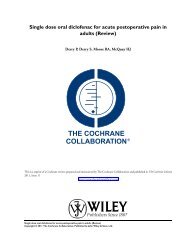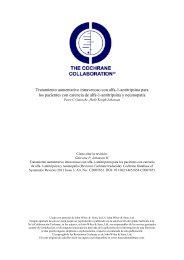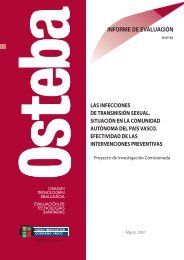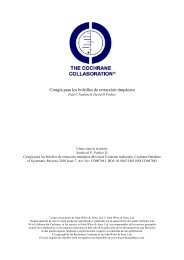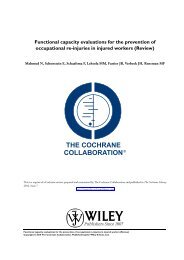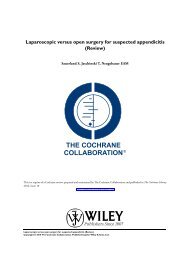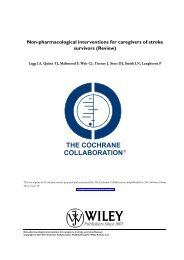Physical fitness training for stroke patients (Review) - Update Software
Physical fitness training for stroke patients (Review) - Update Software
Physical fitness training for stroke patients (Review) - Update Software
You also want an ePaper? Increase the reach of your titles
YUMPU automatically turns print PDFs into web optimized ePapers that Google loves.
Yang 2006 (Continued)<br />
Interventions Intervention: mixed <strong>training</strong> per<strong>for</strong>med as a circuit 30 minutes per day 3 days per week<br />
<strong>for</strong> 4 weeks; circuit comprised 6 x 5-minute lower extremity workstations (standing and<br />
reaching, sit-to-stand from chair, stepping <strong>for</strong>wards and backwards onto blocks, stepping<br />
sideways onto blocks, <strong>for</strong>ward step-up onto blocks), participants encouraged to work hard,<br />
progression achieved by increasing number of repetitions in each 5-minute block, and increasing<br />
step and chair height, and the complexity of task; extended periods (5-minute)<br />
warrant acknowledgement of a cardiorespiratory component despite the author’s title (progressive<br />
resistance strength <strong>training</strong>)<br />
Control: no intervention<br />
Outcomes Included outcomes: gait endurance (6MWT - outcome assessor not blinded); gait speed<br />
preferred (10-metres); 3-metre TUG; step test; isometric strength of knee and hip ankle<br />
extension and flexion; and ankle dorsi-flexion and plantar-flexion (using handheld dynamometer)<br />
Other outcomes: gait cadence and stride length<br />
Notes Trial authors stated ’strength <strong>training</strong>’ but intervention was actually mixed <strong>training</strong>. Data<br />
reported as absolute and change scores<br />
Risk of bias<br />
Bias Authors’ judgement Support <strong>for</strong> judgement<br />
Allocation concealment (selection bias) Low risk Sealed envelopes<br />
6MWT: 6-Metre Walking Test<br />
9HPT: 9-Hole Peg Test<br />
12MWT: 12-minute walk test<br />
ABCS: Activities-Specific Balance Confidence Scale<br />
ACSM: American College of Sports Medicine<br />
ADL: activities of daily living<br />
AQoL: Assessment of Quality of Life Instrument<br />
ARAT: Action Research Arm Test<br />
BBS: Berg Balance scale<br />
BI: Bathel Index<br />
BMI: Body Mass Index<br />
CES-D: Centre <strong>for</strong> Epidemiological Studies <strong>for</strong> Depression scale<br />
CT: computerised tomography<br />
ECG: electrocardiogram<br />
EMS: Elderly Mobility Scale<br />
FAC: Functional Ambulation Classification<br />
FAI: Frenchay Activity Index<br />
FAPS: Functional Ambulation Profile Score<br />
FIM: Functional Independence Measure<br />
FTHUE: Functional Test of the Hemiparetic Upper Extremity<br />
HADS: Hospital Anxiety and Depression Scale<br />
LOT-R: Life Orientation Test - Revised<br />
<strong>Physical</strong> <strong>fitness</strong> <strong>training</strong> <strong>for</strong> <strong>stroke</strong> <strong>patients</strong> (<strong>Review</strong>)<br />
Copyright © 2011 The Cochrane Collaboration. Published by John Wiley & Sons, Ltd.<br />
71



